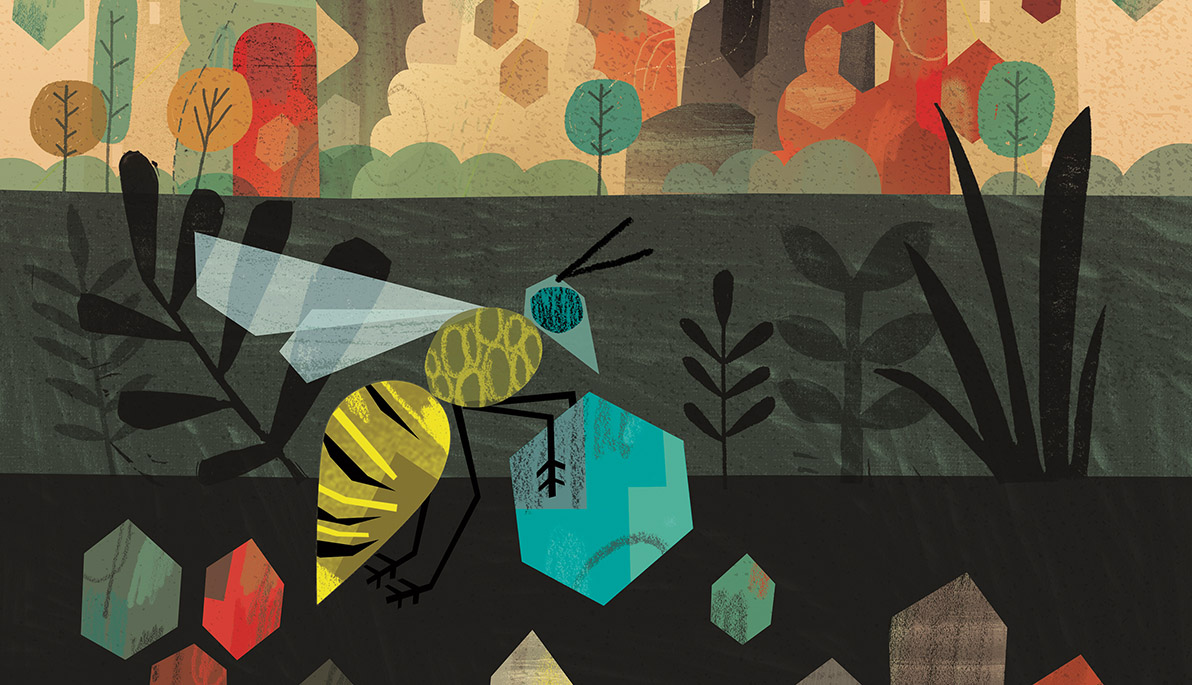
Honey From the Hive: School of Management Industry Partnerships
November 17, 2017
Illustrations by Dante Terzigni
Through collaborations with government, nonprofits, and other organizations, NYIT School of Management is creating a new standard for students to engage with industry partners.
Hidden away on the roof of the building that houses the NYIT-Manhattan café and bookstore, an entire industry is hard at work. Every day, thousands of female worker bees emerge from two beehives to commute to nearby Central Park where they gather pollen and nectar. Managed as part of a hospitality management project at the School of Management, the beehives have become a favorite among NYIT students and faculty and staff members. “I come up here almost every morning to drink my coffee and check on them,” says Robert Koenig, Ed.D., associate professor, chair of the Department of Hospitality Studies, and associate dean of the School of Management. “Everyone loves the bees. The security guards ask me when they see me, ‘How are the girls?’”
See the bees in action.
Just as the bees are building honey from expeditions to Central Park, the students who tend to them are building core skills. The hospitality department is using the hives in courses including Purchasing, Procurement, and Supply Management; Experiential Based Learning: Practicum Sustainability in Hospitality Management; and Food Culture and Contemporary Issues. Students will focus on everything from managing, marketing, and distributing the honey to studying how hotels incorporate sustainability in their business models to seeing firsthand the effects that the beehives have on the community and the environment.
This experiential-based educational venture is just one of the many that the School of Management has launched in order to get creative about providing students with a real-world education. “Historically, higher education has been for training researchers, but over the years it has morphed into something a bit more diverse,” says School of Management Dean Jess Boronico, Ph.D., who made engagement with industry a top priority when developing the school’s most recent strategic plan. “The wisdom has changed, and we asked ourselves, ‘Isn’t higher education there to do more than train researchers? Shouldn’t part of the goal be to train youth to become industry leaders?’ The answer is, ‘Yes.’”
Out of the Hive and Into the Garden
Using New York City as a Classroom
According to Rakesh Mittal, assistant professor of human resource management and chairman of the School of Management Industry Engagement Committee, which initiates and monitors a number of the school’s partnerships, engaging with industry is vital to students’ training. “It is essential that we are in sync with what is happening in the field of business, what the companies are doing, what their priorities are, and what their challenges are,” he says. “This helps to take concepts out of the classroom and into the real world.” He is helping students do just that. Last year, Mittal launched a partnership with the Queens Chamber of Commerce. Students and faculty members worked with the nonprofit organization to help revise their bylaws, which were not up-to-date with current needs and trends. (Not your typical course project!)
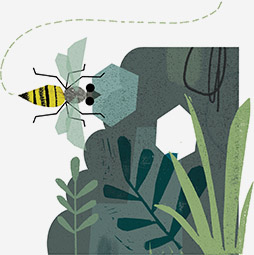 The effort was so successful that the team re-partnered to help the chamber increase membership and improve retention. They developed a survey, interviewed recruiters who work for the chamber, and asked local business owners what kind of benefits they would be interested in as members. They also met with the president and manager of the Chamber of Commerce to help pinpoint areas that needed the most attention. The students shared their interim recommendations with the chamber, and they are currently working on their final report.
The effort was so successful that the team re-partnered to help the chamber increase membership and improve retention. They developed a survey, interviewed recruiters who work for the chamber, and asked local business owners what kind of benefits they would be interested in as members. They also met with the president and manager of the Chamber of Commerce to help pinpoint areas that needed the most attention. The students shared their interim recommendations with the chamber, and they are currently working on their final report.
“I really got excited to talk to the business owners and cold interview them,” said Joseph Lao, a student who worked on the project. “By doing a practicum, you’re going to learn a lot more than you would have learned in class. Sitting in the room, face-to-face, talking with clients, brings up new questions that wouldn’t have occurred to you just writing a paper.” Engaging with top-level management and industry leaders is not an unusual occurrence for students in the school.
Each year, Koenig partners with some of the city’s most respected hotels as part of his Hospitality Sustainability course. Students meet with general managers and assess the sustainability practices. Over the course of the semester, they review each department based on best practices put forth by Green Key Global, an international environment certification body. So far, students have worked with the Benjamin Hotel, Gardens NYC, and Hilton Times Square. “Each hotel has been a unique project. They all have different strengths,” says Koenig.
At the end of each project, the students write up a report (based on the Green Key Global assessment parameters) outlining recommendations for how the hotel can improve sustainability. “The Hilton Times Square won an award for sustainability after the NYIT students did their assessment,” says Koenig. “All the hotels stay in touch and want to build programs, internships, come in as guest speakers. It’s a win-win for students and businesses.”
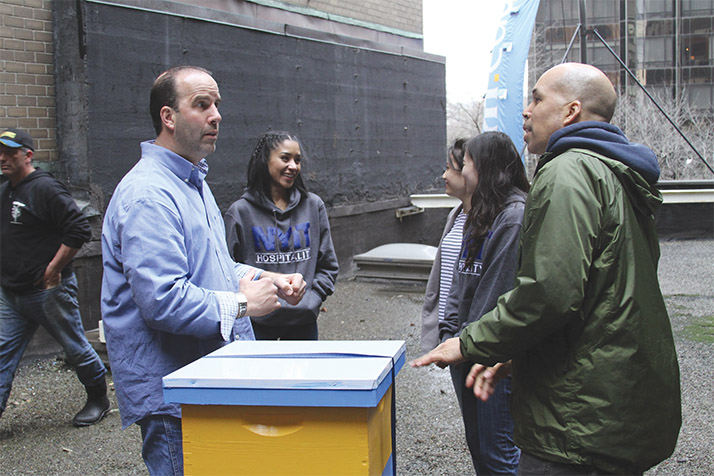
(Left to right) Robert Koenig; hospitality students Alina Richard, Peggy Chiang, and Yuhan Jiang; and Sean Flynn from Silvermine Apiary LLC take care of the beehives.
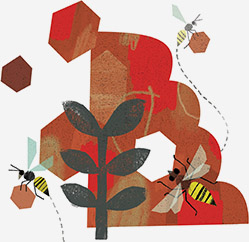
Cross-Pollination
Mutually Benefiting from Engagement
Like the bees, who help flowers and trees flourish through the act of pollination, students gain experience from working with local industry and contribute to the businesses that are hosting them. This is especially true for organizations that are just starting out and can’t necessarily afford the high costs of PR firms and consultants.
Assistant Professor of Marketing Colleen Kirk says the focus on industry engagement was one of the things that drew her to NYIT in 2016. “At one time, professors were accustomed to just standing up in front of a class and giving a lecture to share their knowledge,” she says, “but today, the world has changed so much, so our teaching practices are changing dramatically, too. We’re trying to take this philosophy of engaging with industry and having a real impact and bring it right into the classroom.”
We're trying to take this philosophy of engaging with industry and having a real impact and bring it right into the classroom.
Colleen Kirk
To do that, Kirk partners with businesses that can gain the most from her marketing students’ contributions, such as startups. “Most of the businesses we talk to have very limited marketing backgrounds and they need us to help them, even it’s just with articulating what their product does,” says Kirk.
When Greg Egan, the founder of Bamboo Science Group, came to Kirk’s International Marketing class, he needed help marketing the company’s services in foreign countries. His invention, the Pyrolyzer, can convert bamboo into a high-purity carbon (charcoal) right in the field, which can then remove impurities in air and water. The invention has the potential to be a game changer in developing countries, but Egan is an entrepreneur, not a marketing agency. Students took on the challenge by identifying countries where they thought the product would do well and developed marketing plans.
“One team came up with the idea of marketing the product in Colombia, which had never occurred to Greg,” says Kirk. “It is a huge area for bamboo growth and has the right climate, and with new political agreements in place, there’s new potential there.”
The project also had an immediate effect on the students. M.B.A. student Priyesha Dani explains, “I was heavily applying concepts not only from marketing but also from economics, supply chain management, industry research, and strategy fields. Even though I am not pursuing marketing as my major, I have benefited academically and professionally from the project.” Four students went on to do a practicum with Egan to explore the bamboo tea market, and one was even hired as an intern.
“The businesses benefit hugely from the knowledge, new ideas, and latest thinking about marketing, social media, and digital marketing the students bring,” says Kirk. “Businesses also get a lot from feeling like they’re contributing to the next generation of business leaders.” Kirk has more partnerships in the works, including one with Custom Collaborative, which provides immigrant women in New York City the tools and support to start a small business.
Beyond the Buzz
Measuring Results in Meaningful Ways
On the roof of 1849 Broadway, students are learning to become expert beekeepers under the supervision of Andrew Coté of Silvermine Apiary, LLC, a family beekeeping operation in existence since the 1800s. They’re also becoming entrepreneurs. As the hives mature, they are expected to yield 50 to 100 pounds of honey a year, which will be packaged and marketed for distribution throughout NYIT’s campus.
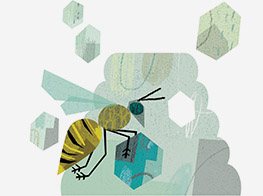 Not every project results in something as tangible as honey, but measuring the results and impact of these initiatives is another important part of the plan. “When we wrote our strategic plan in 2015, two of the strategic initiatives were to engage in meaningful ways with industry and also to move from a tradition of measuring quality to measuring impact,” says Boronico. “It is great to do quality work, but if you’re not going to actually apply it in the market, does it really make a lot of difference?”
Not every project results in something as tangible as honey, but measuring the results and impact of these initiatives is another important part of the plan. “When we wrote our strategic plan in 2015, two of the strategic initiatives were to engage in meaningful ways with industry and also to move from a tradition of measuring quality to measuring impact,” says Boronico. “It is great to do quality work, but if you’re not going to actually apply it in the market, does it really make a lot of difference?”
Director of Internal Operations and External Relations Steven Haines is in charge of tracking the outcomes of projects launched through the Industry Engagement Committee. “Sometimes, impact can be measured by a testimonial from a company saying that a project resulted in a certain amount of profit or clicks on their website,” says Haines. Impact can also be measured through other factors, such as if a company hires a student, makes a donation to the school following a project’s completion, or does another project with the school. “These are all examples we’ve seen,” he adds.
As always, outcomes speak to the success of these projects. Nearly all have resulted in students being re-engaged by companies to work on other initiatives or being hired as interns or employees.
And like the bees who venture far to conduct their fieldwork, they always return to where they started and contribute to the hive. “Often, when I take my students out to engage with the industry, the people meeting them and giving industry tours are alumni. That is really great for our current students to see,” says Koenig. “It shows these programs will have a real, lasting impact on their educations and their lives.”
Read about more partnerships
This article originally appeared in the Fall 2017 issue of NYIT Magazine.

By Alix Sobler
More Features

An Alumnus’ Commitment to the Environment
As an energy management graduate from New York Tech’s Vancouver campus, Jasdeep Gulati (M.S. ’22) is highly invested in educating people about environmental and climate sustainability.

Vancouver Faculty Win University-Sponsored Research Awards in New Program
The new Global Impact Research Grant (GIRG) program has been developed to keep Vancouver-based faculty connected to faculty and research projects being conducted on the university’s New York campuses.

Studying Climate Change One Degree at a Time
Junhua Qu (M.S. ’24) began her collegiate journey in Beijing. But, her interest in climate change took her to New York Tech’s Vancouver campus to study energy management.